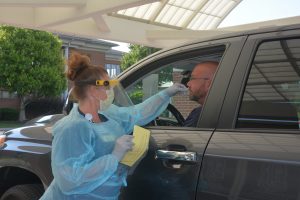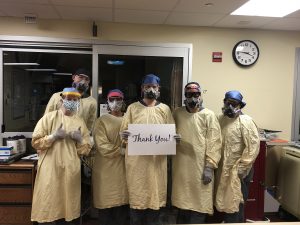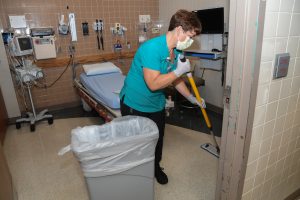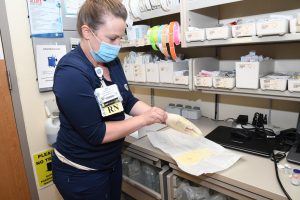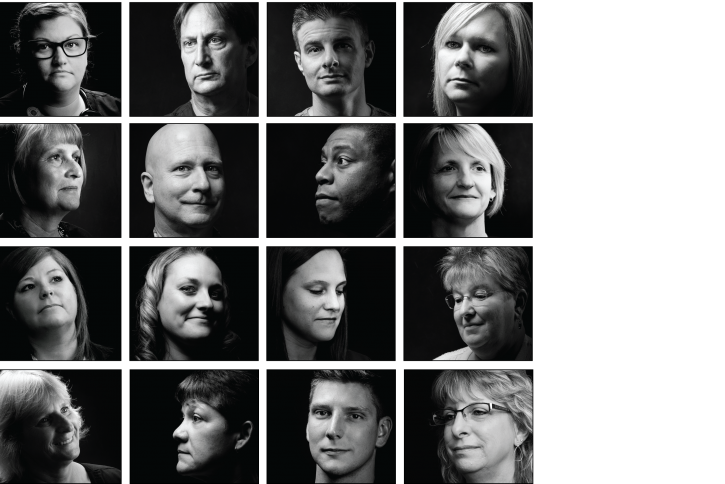
Article originally published Fall 2020 in The Monitor magazine.
Similar to healthcare organizations across the country, COVID-19 has had a significant impact on our staff, physicians and administrators at Fairfield Medical Center.
Regardless of department or job title, every person on our team has been on the frontlines from the very beginning. We have encountered trials and triumphs along the way, taken on new tasks, adjusted to new policies and learned new routines. We asked 16 of FMC’s essential workers to provide insight into how their job has changed as a result of COVID-19, and what they have learned during this time. Here are their stories:
- Devon Marshall, Emergency Preparedness
- Cory Kilbarger, Observation Unit
- Tina Anderson, Urgent Care
- Tina Cass, Infection Control
- Kristin Shuman, Infection Control
- Rachel Deacon, Laboratory
- Donna Stebelton, Laboratory
- Dr. Andrew Dagg-Murry, Infection Control
- Dr. Mark Darnell, Emergency Department
- Ryan Copeland, Respiratory Therapy
- Alisha Moore, Respiratory Therapy
- Casey Henderson, Emergency Medicine
- Stacy McKee, Emergency Medicine
- Dr. Renee Wagner, Chief Medical Officer
- Susan Decker, Environmental Services
- Debbie Hiles, Environmental Services
 Devon Marshall, Emergency Preparedness
Devon Marshall, Emergency Preparedness
As a liaison between FMC and all other state and county agencies, Devon Marshall’s role as emergency management coordinator is not a 9-5 position. “Leaving work at work is not an option for me,” he said. “Daily reporting, supply shortages, press conferences, testing site deployments, internal safety procedures, staffing shortages, virtual environments, medical bed space/capacity, protests and riots are just a few of the things keeping me up at night.”
That anxiety, said Devon, would be much worse without the support and assistance of the community and other emergency agencies. Through that coordination, FMC has been able to navigate the many hurdles that have come with COVID-19, including staying ahead of the supply shortage curve. In addition, Devon credits his emergency preparedness training for keeping him focused and ahead of the game. “Preparedness through annual training is key to an effective disaster response,” he said. “When stress levels are high, and people’s lives are at stake, it’s my training that sees me through.”
As the country continues to move forward through this challenging time, Devon said now is the time for people to come together, not point fingers, place blame or spread false information based on emotion and fear. “This is a time to show one another grace and be sympathetic to the health needs of others,” he said. “All emergency response begins on a local level first. It’s your county leaders and local emergency response agencies that need your support and prayers right now.”
 Cory Kilbarger, Observation Unit
Cory Kilbarger, Observation Unit
If there is anything Cory Kilbarger has learned from working directly with COVID-19 patients in FMC’s Observation Unit, it’s that masks matter. For 12 hours a day, Cory wears a mask to not only protect himself, but the critically ill patients in his care. “I have seen multiple patients who tested positive without any symptoms, so wearing a mask is beneficial in not spreading the virus from asymptomatic people,” said Cory, team lead for Cardiovascular Services.
Before COVID-19, Cory mainly cared for patients with cardiac issues. He now cares for patients who have tested positive for COVID-19 or are assumed to have the virus, and are having difficulty breathing. Caring for these patients requires Cory and his colleagues to work inside a negative air pressure room, which is designed to prevent airborne diseases from escaping the area. They must also wear full PPE – N-95 masks or a respirator, face shields, gowns and gloves. Cory said while the PPE gets uncomfortable by the end of a long shift, it’s nothing compared to what his patients are experiencing. “Seeing how sick these patients can get is really hard to watch, but I know our team is providing the best care possible.”
Cory said the past five months have been eye-opening. He has a newfound respect for the doctors and nurse practitioners who work in the areas of infectious disease and critical care pulmonology. He has seen the effects of COVID-19 firsthand and has discovered a strength within himself that he never knew he had. “I have found that during all this I am more resilient to change than I previously thought,” he said. “I’ve found even more empathy for those who are hurting and sick. I’ve found that all I need is my faith and the love of my family to make me happy.”
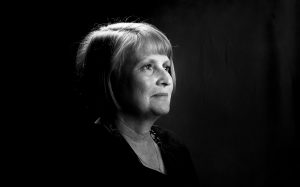 Tina Anderson, Urgent Care
Tina Anderson, Urgent Care
Tina Anderson understands how scary it must be for a patient when they are about to get a COVID-19 test. They see an employee walking towards them in a full isolation suit with a nasal swab in hand, and they immediately become apprehensive. “The majority of our patients are more scared of having the swab done than of the results,” she said.
Knowing those fears exist, Tina and her team at FMC’s Outpatient COVID-19 Testing Site at Fairfield Healthcare Professionals First Medical Urgent Care try to keep the experience as positive as possible. “All of the amazing people that work at the drive-thru testing site are genuinely caring, kind, friendly human beings,”Tina said.“They always do what is in the best interest of the patient and put safety and personal connection at the forefront of every interaction.”
As the manager of FHP First Medical Urgent Care, Tina and her team were tasked in April with moving the COVID-19 testing site from FMC’s River Valley Campus to a more permanent location near the Urgent Care. With the help of employees Robin Saum, Sarah Large, Devon Marshall and many others, they accomplished that feat in just one day. Since then, Tina has assembled a staff of people from various departments to be a part of the COVID-19 testing team. On average, approximately 80-120 patients pass through the site in a day, and in August, the site hit a milestone of more than 10,000 tests administered.
Tina said she’s proud of the team she’s assembled, as each person goes above and beyond to ensure patients feel comfortable during what can be an uncomfortable moment. “I believe that everyone’s new normal is that of ‘How can we make a positive difference in the lives of others?'” she said.
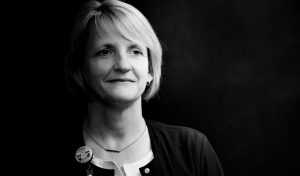
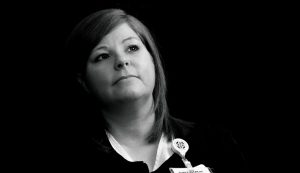
Tina Cass & Kristin Shuman, Infection Control
One of the biggest components of an infection control practitioner’s daily job is education: how to properly wash your hands, how to put on and remove PPE, how to sanitize equipment and rooms. This information is crucial in preventing the spread of infection on a normal day, much less during a pandemic. So when COVID-19 hit, infection control practitioners Kristin Shuman and Tina Cass prayed that they had done their jobs well.
“As an infection control nurse in a time when our PPE use is not normal, and it is vital that staff put on and remove PPE appropriately, I had many sleepless nights,” Tina said. “I prayed that we had clearly educated our staff, and that everyone had heard the message and its importance to keeping them safe.”
Tina and Kristin’s tireless efforts were not in vain. With their leadership, FMC has stayed on top of the frequent changes coming out of the Centers for Disease Control and the Ohio Department of Health. In addition, Tina and Kristin have worked hard to find answers to questions they never thought they would be asked, such as how to reuse PPE and what to do if a certain disinfectant ran out. They knew tough and costly decisions would have to be made if such a scenario occurred, and were grateful for the support they received from hospital leadership.
“Every decision was based on the safety of our staff and our patients. Multiple times I heard, ‘It doesn’t matter the cost … if we need to have it, purchase it,’” Tina said. “That being said, of course we still have to be good stewards, but safety truly did trump everything else when it came time to make a decision.”
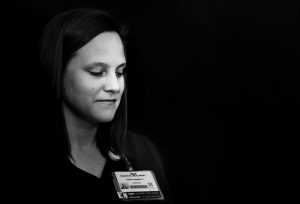
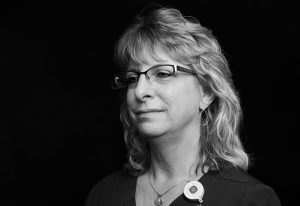
Rachel Deacon & Donna Stebelton, Laboratory
When a patient is tested for COVID-19, a lot happens between the time the test is administered and the time the results are delivered. The staff who work in FMC’s Lab are the go-betweens who process the test, ship it out and manually enter in the results. It’s a cycle that doesn’t stop; currently, FMC’s Lab processes 600-800 tests a week, with its team working around the clock to get patients their results in a timely manner.
“Having multiple COVID orders and multiple locations helping to do testing, we are constantly managing a pending list and incoming results that need manually entered, not only into our electronic medical record system, but also into spreadsheets to help track numbers for reporting purposes,” said Rachel Deacon, Lab team lead.
As someone who sees the test results come in every day, Rachel has learned not to discount COVID-19. “This is real, and it is in our communities,” she said. “We are still seeing positives every day, and many are screening tests for patients without symptoms.”
Donna Stebelton, clerical specialist for the Lab, said she puts together approximately 150 COVID testing kits a day, in addition to all of the tasks she handled prior to the pandemic. She said she’s proud that FMC has met the demand for testing, particularly early on with supply shortages.
“We have such a great team in the Lab that have worked hard to provide the best patient care to our community during a trying time,” she said.
 Dr. Andrew Dagg-Murry, Infection Control
Dr. Andrew Dagg-Murry, Infection Control
Before “COVID-19” had become a household name in early 2020, infectious disease physician Andrew Dagg-Murry, MD, and a team of healthcare workers at Fairfield Medical Center were already preparing for its arrival. Twice a day, FMC’s COVID-19 Committee would meet to share information that, an hour later, might be completely different. There were difficult decisions to make regarding patient care, visitation, testing, personal protective equipment, and most importantly, what to do if the hospital experienced a surge of patients. “We had many versions of each plan,” Dr. Dagg- Murry said.
From the very beginning, and through the long, uncertain months to follow, Dr. Dagg-Murry’s calm and levelheaded leadership helped guide FMC through the pandemic. It was a task that proved to be all-consuming. “Going to four hours of meetings a day, rounding in areas of the hospital where we needed to have hands-on, face-to-face contact to explain what our new processes were and help the staff to understand and feel safe, took a lot of time,” he said. “The infectious disease service also saw every patient admitted with potential or positive COVID-19 in March, April and May.” FMC’s Chief Medical Officer Renee Wagner, MD, said Dr. Dagg-Murry was able to take a plethora of information and break it down in the way that was not overwhelming for the rest of the team. “We would not have survived without Dr. Dagg-Murry leading us through the COVID Committee waters,” she said.
 Dr. Mark Darnell, Emergency Department
Dr. Mark Darnell, Emergency Department
When FMC first began preparing for COVID-19, there were a lot of unknowns about how the organization’s two emergency departments would be impacted. With concerns about patients potentially overwhelming those areas, Mark Darnell, MD, medical director of FMC’s ED, worked with the organization to come up with an overflow plan. “I think most of us felt this would be like influenza times 10 or 100,” he said. “We did not anticipate how many people would stay home and not go to the Emergency Department.”
That in itself posed a different problem: fear of contracting COVID-19 was preventing patients from seeking emergency care for other potentially life-threatening problems. In mid-April, FMC’s ED volume was 50 percent of normal, and patients seeking heart attack and stroke care had dipped 40 percent nationally. Since then, Dr. Darnell and FMC have worked hard to alleviate the community’s fears and encourage them to come to the hospital if they require emergency care. “We were extremely fortunate to have the hospital provide the necessary PPE to protect us,” he said. “We screen all staff and visitors, as well as ED patients. We all wear masks. The ED is safe, much safer than any other public place.”
 Ryan Copeland, Respiratory Therapy
Ryan Copeland, Respiratory Therapy
Before COVID-19, respiratory therapist assistant Ryan Copeland’s day was entirely clinical – running EKGs, assisting with emergencies and getting to know his patients. One day, his manager pulled him aside with a request – FMC was in need of a courier who could deliver COVID-19 tests to Riverside Methodist Hospital and The Ohio State University Wexner Medical Center every day. The courier would also be responsible for taking FMC’s used N-95 masks to Battelle Memorial Institute in Columbus to be sanitized for reuse. Ryan agreed to accept the position and temporarily step away from what he enjoyed most – patient care. “I took this as a way for me to be able to help my community,” said Ryan, who makes the trek to and from Columbus 5-6 days a week.
As FMC’s COVID-19 courier, Ryan ensures that anxious patients get their COVID-19 results in a timely manner, and his trips to Battelle Memorial Institute also mean that his fellow colleagues can continue to safely care for patients without the worry of a PPE shortage. Working outside the hospital has given Ryan a new sense of purpose – and he’s also found a great deal of hope and joy along the road. “As a courier, I’ve had the opportunity to make some great friends during these hard times,” he said.
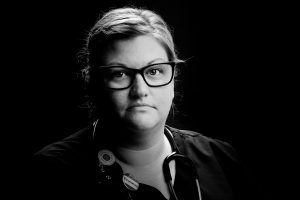 Alisha Moore, Respiratory Therapy
Alisha Moore, Respiratory Therapy
As a mother and a diabetic, Alisha Moore knows full well the risk of working in a hospital during a pandemic. She fears what could happen if she becomes ill or brings the virus home to her child. However, she also knows that her patients need her, especially now, and that has kept her brave during a scary time.
“The scariness of not knowing a lot about COVID-19 has been hard on my co-workers and myself. A lot of us are parents and some of us take care of elderly family members,” said Alisha, team lead for Respiratory Therapy. “However, the respiratory therapists at Fairfield Medical Center have never once hesitated to take care of our COVID-19 patients.”
Alisha said her job has changed a great deal as a result of the pandemic. Procedures and treatments have been modified and every therapist must now don PPE each time they enter a patient’s room. The silver lining has been the exposure her line of work has received – respiratory therapists are no longer solely viewed as “the breathing treatment” people, but also a critical component of the patient care team, she said.
“I am extremely proud of how my department has handled all of this,” Alisha said. “We play as a team and even though it’s scary, it has been a shining moment for our staff.”
She added that the past few months have given her a new appreciation for the simple things in life. “I have learned to never take for granted our freedom to move around, visit loved ones, go to the movies, eat out, go to a park, or go to work without the worry of catching a deadly virus,” she said.

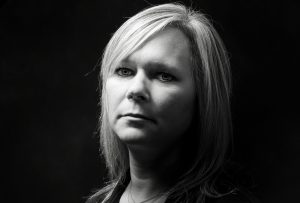
Casey Henderson & Stacy McKee, Emergency Medicine
The staff and physicians in FMC’s Emergency Department never know what each new day will bring. “We could have 50 sick patients walk through the door or 100,” said Casey Henderson, ED supervisor. She can attest to the fact that being able to adapt to change is a must when you work in emergency care, especially during a pandemic. From the start, Casey’s biggest hurdle was scheduling employees for a patient volume that was largely uncertain. When it ended up being lower than predicted, she worked with staff to help them find new temporary roles within the organization in order to avoid a cut in hours.
ED secretary Stacy McKee was one of those employees. Prior to COVID-19, a large part of her job involved scheduling meetings and trainings. When FMC stopped all in-person gatherings, that task went away and Stacy faced the possibility of temporarily dropping to part-time. “I cross-trained to work as a unit clerk so I could help with the influx of patients … then was brought back to full-time by taking temperatures in the lobby twice a week,” she said.
Casey said she’s impressed with how employees like Stacy have been flexible at a time when it’s needed most. She’s also proud of the doctors and nurses in her department who have not only cared for their patients, but provided comfort to them when visitor restrictions prevented the patient’s loved ones from being by their side. “The first thing that goes through our heads as caregivers is not, ‘Does this patient have COVID?’ it is, ‘What exactly does this patient need, and how can we help the patient?’ ” Casey said.
Stacy agreed. “I’ve seen how scared patients are when we had to tell them their loved ones couldn’t stay with them … I have a new perception of what our frontline workers do every day, even before the pandemic.”
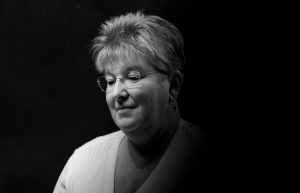 Dr. Renee Wagner, Chief Medical Officer
Dr. Renee Wagner, Chief Medical Officer
Sleepless nights have become the new norm for Renee Wagner, MD, since the arrival of COVID-19. As Chief Medical Officer and an administrative COVID leader at FMC, the virus is a topic that never leaves her mind, even in the dark of night.
“From February until the end of May, I felt like I did nothing but think about COVID; I would wake up in the middle of the night and think, ‘Oh, we forgot about this,'” she said. “My other job duties didn’t even cross my mind until probably mid-June when it felt like we had some breathing room before gearing up for the fall season.”
For Dr. Wagner, the hardest part of this pandemic has been keeping up with information that is constantly changing. Each day presents a new operational question to consider and, as so many other hospital administrators have learned, there is no playbook for COVID-19.
“It has been overwhelming the amount of information that is not known about this virus and how quick guidance changes can occur,” she said. “It seemed as soon as we communicated a change, it was obsolete.”
With all of the unknowns, Dr. Wagner said one thing is for certain – washing your hands, socially distancing from others and wearing a mask are essential in stopping the spread of the virus and protecting those around you.
“This virus is real and it’s lethal – we have experienced that firsthand at FMC,” she said. “It is not a sign of weakness to help one another.”
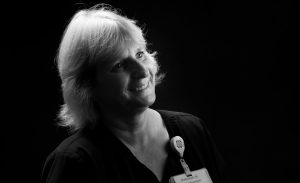
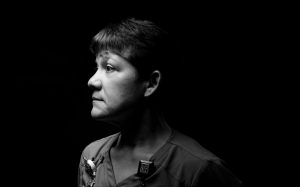
Debbie Hiles & Susan Decker, Environmental Services
As an Environmental Services employee, Debbie Hiles has always known that the work she does matters. That’s why, when she was assigned to clean FMC’s COVID-19 unit, she didn’t let fear get the best of her.
“Our job is important – we’re the heroes behind the scenes,” she said. “We are saving lives, just like the doctors and nurses, by stopping the spread of the COVID-19 virus and other infectious diseases.”
Susan Decker, who is assigned to clean FMC’s Emergency Department, agrees. She is quick to dispute anyone who says hospitals are an unsafe place to be during a pandemic. “We are constantly cleaning and disinfecting surfaces,” said Susan, who sanitizes the ED restrooms and waiting room multiple times a day in addition to deep-cleaning every patient room. “We have always made cleanliness a priority at FMC, but with COVID-19, we are even more vigilant.”
In addition to high traffic areas, the EVS Team has also zeroed in on sanitizing high-touch areas every two hours, including keyboards, telephones, door handles and even pens and pencils. “We’re not letting COVID-19 win,” Debbie said. “We’re working hard every single day to keep our facility safe for everyone.”
